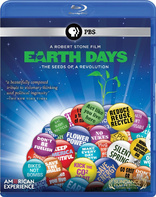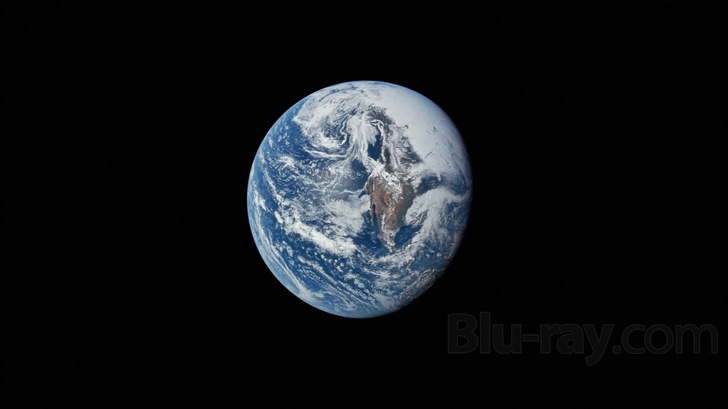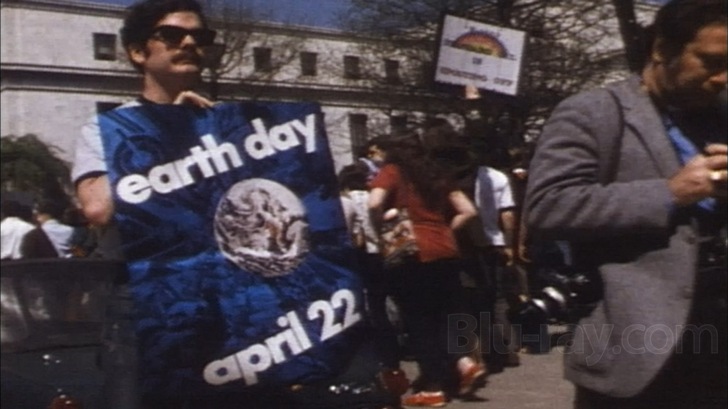American Experience: Earth Days Blu-ray Movie
HomeAmerican Experience: Earth Days Blu-ray Movie 
PBS | 2010 | 120 min | Not rated | Apr 20, 2010
Movie rating
7 | / 10 |
Blu-ray rating
| Users | 0.0 | |
| Reviewer | 3.5 | |
| Overall | 3.5 |
Overview
American Experience: Earth Days (2010)
Earth Days traces the origins of the modern environmental movement through the eyes of nine Americans who propelled the movement from its beginnings in the 1950s to its moment of triumph in 1970 with the original Earth Day and to its status as a major political force in America.
Director: Robert Stone (IV)| Documentary | 100% |
Specifications
Video
Video codec: MPEG-4 AVC
Video resolution: 1080p
Aspect ratio: 1.78:1
Original aspect ratio: 1.78:1
Audio
English: Dolby Digital 5.1
English: Dolby Digital 2.0
Subtitles
English
Discs
25GB Blu-ray Disc
Single disc (1 BD)
Playback
Region A (B, C untested)
Review
Rating summary
| Movie | 3.5 | |
| Video | 3.0 | |
| Audio | 3.0 | |
| Extras | 2.0 | |
| Overall | 3.5 |
American Experience: Earth Days Blu-ray Movie Review
Less a guilt trip than a trip down memory lane.
Reviewed by Casey Broadwater May 4, 2010On April 22nd of this year, the 40th anniversary of Earth Day was both championed and overshadowed by the Blu-ray/DVD release of James Cameron’s CGI juggernaut Avatar, a film that basically screams its environmental message until it’s as blue in the face as Pandora’s native Na’vi. (As I mentioned in my review of Avatar, what better way to spread an Earth- first, let’s-all-go-green message than to distribute millions of non-biodegradable plastic cases that will inevitably end up in a landfill somewhere? I digress.) Avatar’s record-breaking box-office and home video sales may prove that the green mentality has reached the very pinnacle of pop culture, but popularity doesn’t exactly equal proactiveness, or change. Earth Days, part of PBS’s award-winning American Experience series, takes a good, hard—but often nostalgic— look back at the beginnings of environmentalism, acknowledging the movement’s early legislation- altering triumphs, but not shying away from its failure to sustain real public and political interest into the Reagan era. As director Robert Stone says in his commentary track for Earth Days, “We’ve paid lip service to the problem, but we’ve avoided making the truly necessary changes about how we run our economy and how we live our lives.”

Our pale blue dot...
Using archival footage intermixed with talking head-style segments, Stone tells the story of the nascent, post-war environmental movement. In the 1950s, progress was equated with economic expansion, technological achievement, and the accumulation of material goods. Yet, for all of the prepackaged foods to cook in our new self-cleaning ovens, and despite our love affair with the gas-guzzling tanks we drove on the newly-opened interstate system, Americans weren’t really any happier. Post-atom bomb, humans now had the geophysical power to alter the earth, destroy ecosystems, and potentially bring thousands of species to extinction—including our own. The nuclear age opened the door to the future, but it also let in a cold draft of existential dread. Slowly, progressive-thinking scientists and researchers began to reevaluate our assumption that there was no finitude to our resources. The environmental movement officially began with the 1962 publication of Rachel Carson’s “Silent Spring,” a clear-eyed warning about the effects of pesticides and other pollutants on the world’s ecosystems.
Stone’s visual style is rich in clever, often disturbing thematic juxtaposition. In one eerily cut sequence, we see picnicking kids merrily eating their white-bread sandwiches as they get sprayed by billowing clouds of DDT. To visually press his lip service point, Stone opens his documentary with a montage of every president from JFK to Bush the Younger monologuing gravely about the importance of protecting the environment and generating sources of clean energy. (“And here we have a serious problem. America is addicted to oil,” says George W., somewhat ironically.) We recognize, in their perfectly turned phrases and for-the-camera self-seriousness, that it’s all political grandstanding. Stone subtly impresses that there’s not much for politicians to gain from addressing long-term problems when they’re focused much more keenly on the short-term: reelection.
Still, he gives credit where credit is due. In his 1970 State of the Union address, Richard Nixon proclaimed the coming of the “environmental decade.” It was, of course, a political chess move— one commentator says Nixon “didn’t have an environmental nerve in his entire body”—but under his watch, numerous anti-pollution laws, like Clean Air and Clean Water, were passed and put into effect. Reagan, however, gets quite the drubbing. We see footage of Carter installing solar- powered water heaters in the White House. Later, we learn Reagan had them summarily removed upon entering office, potent symbolism for the Clint Eastwood-esque president’s practically non-existent environmental policy. The only politician who’s outright idolized in the film is former Wisconsin Senator and avid outdoorsman Gaylord Nelson, who came up with the idea for the “environmental teach-in” that would become Earth Day in 1970.
The documentary is less about politics, however, than the cultural shift regarding conservation that took place in the years prior to and immediately after that first momentous Earth Day, which drew 22 million Americans out into the streets to voice their support. To personalize the nascent environmental movement, Stone interviews several early leaders and activists, and gives them almost superhero-like nicknames. Stewart Brand, internet pioneer and creator of The Whole Earth Catalog—a kind of Sears and Roebuck for the D.I.Y. green energy crowd—is The Futurist. Denis Hayes, who coordinated the first Earth Day, is known as The Organizer. The Biologist is Paul Ehrlich, author of the best-selling “Population Bomb,” which posited grim predictions for a planet rapidly expending its natural resources. Also included are former U.S. Secretary of the Interior Stewart Udall (The Conservationist), so-called “hippy astronaut” Rusty Schweickart (yes, The Astronaut), scientist Denis Meadows (The Forecaster), population control activist Stephanie Mills (The Radical), and renewable energy pioneer Hunter Lovins (The Motivator). Each interviewee looks back on the milieu with world-weary fondness, telling stories and detailing the excitement of the times, but also expressing dissatisfaction and a hint of regret over the way the movement petered out in the 1980s. There really is an undercurrent of hope here, though, which sets Earth Days apart from other recent environmentally themed documentaries. An Inconvenient Truth, The 11th Hour, Earth 2100—all are presented as bleakly prophetic, prepare-for-the-worst guilt trips, meant to shock us into immediate action. Earth Days takes a notably different tact. Instead of scaring us straight, it honors the efforts of the previous generation, and quietly challenges us to do them one better.
American Experience: Earth Days Blu-ray Movie, Video Quality 

Since Earth Days is constructed almost entirely from stock footage, PBS's 1080i/AVC-
encoded transfer is really all over the place in terms of picture quality. It's obvious that some, if
not
most of the older material was simply upscaled instead of remastered in high definition, so don't
expect anything like For All Mankind or any of the other stunningly restored
documentaries
that have come out on Blu-ray in the past few years. Still, the footage is perfect for the tone of
the
film, all of it looking appropriately old and nostalgia-inducing, even the grimy, smeary video clips
from the 1970s and 80s. There are some quirks, however, that mar the presentation somewhat.
You'll notice frequent macroblocking, banding, and aliasing, strange motion artifacts, and
flickering
shimmer. Most of this is understandable in the vintage footage, but the defects occasionally creep
into the modern talking head sequences. Still, the stuff that was shot on high definition video
looks
decent, with more than adequate detail and texture, strong black levels, and color that's bright
and
natural. These scenes probably give the Blu-ray an edge over the DVD—I don't have a DVD copy
to
compare—but I can't imagine the difference being too drastic.
Do note that as it was practically impossible to capture usable screenshots in 1080i, all of the
screengrabs in this review were captured at 720p and do not represent the full visual quality of
this title.
American Experience: Earth Days Blu-ray Movie, Audio Quality 

Per usual, PBS brings another documentary to Blu-ray without lossless audio, but it really doesn't bother me for these kinds of broadcast-quality releases. The disc includes two Dolby Digital choices, a solid 2.0 mix and a more expansive 5.1 track, both offering exactly what's required—crystal clear, perfectly balanced voices during the interview segments, and a sonic backdrop of quiet, complementary music. Michael Giacchino did the score—he's the musical mind behind the brilliant motifs for ABC's Lost—and the compositions are sweeping and elegant, underscoring the triumphs of the environmental movement with modest grandeur. (An oxymoron, yes, but that's what it sounds like.) The music has a nice presence, with good depth and breadth, and if you choose the 5.1 track, you'll find a surprising amount of output from the rear speakers. There are even a few cross-channel panning effects, like when a jet flies from left to right. There's nothing inherently wowing here in terms of audio design or fidelity, but both of these Dolby Digital tracks do exactly what they need to do.
American Experience: Earth Days Blu-ray Movie, Special Features and Extras 

Commentary by Director Robert Stone
Stone's commentary is practically a second narration for the film. Not only does discuss the details
of how the documentary was made—how licensing rights were procured for stock footage, how he
decided who to interview, etc.—he also goes into more depth about the issues being presented. A
candid, informative commentary track.
First Film: Pollution 1972 (SD, 3:49)
Shot on a single reel of Super-8mm, Robert Stone's first film—made when he was twelve—is a
funny, obviously amateurish but earnest attempt to comment on the pollution that he and his
friends noticed in their home town. Since the original audio has gone missing, Stone reminisces
over the footage.
American Experience: Earth Days Blu-ray Movie, Overall Score and Recommendation 

We've seen a glut of environmentally themed films in recent years—most of them grief-stricken, alarmist diatribes that resort to scare tactics to wake up an environmentally sleepy-eyed populace. Earth Days is a little different, less wide eyed in terror and more of a celebration of the environmental movement's formative years. I happen to find this infinitely more inspiring. Casually recommended.
Other editions
American Experience: Other Seasons

American Experience: Into The Deep - America, Whaling & The World
2010

American Experience: Freedom Riders
2011

Clinton
American Experience: Clinton
2012

The Amish
American Experience: The Amish
2012
Similar titles
Similar titles you might also like
(Still not reliable for this title)

Fahrenheit 11/9
2018

I Am Not Your Negro
2016

Waiting for "Superman"
2010

Prohibition
2011

Where to Invade Next
2015

Fahrenheit 9/11
2004

Hillary's America
2016

The Fog of War: Eleven Lessons from the Life of Robert S. McNamara
2003

Hearts of Darkness: A Filmmaker's Apocalypse
1991

Capitalism: A Love Story
2009

Enron: The Smartest Guys in the Room
2005

A Place at the Table
2012

Studio 54: The Documentary
2018

An Inconvenient Sequel: Truth to Power
2017

The Wolfpack
2015

Roger & Me
1989

The Gatekeepers
2012

America: Imagine the World Without Her
2014

Harlan County U.S.A.
1976

Inside Job
2010